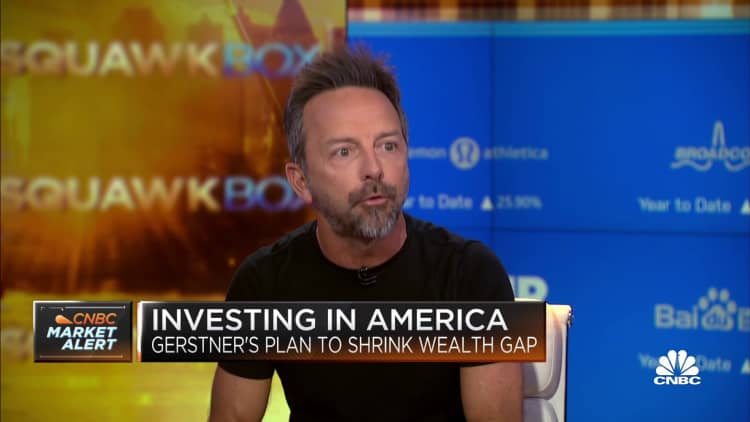The Fearless Girl statue facing the Charging Bull sculpture in the Financial District of New York, U.S., on Wednesday, March 8, 2017.
Bloomberg | Bloomberg | Getty Images
Government-funded investment accounts for children could be on the horizon, and if tech investor Brad Gerstner has his way, corporate America will match the funds. The effort, which is still in the early stages, could prove highly beneficial for companies and their employees.
Gerstner been working with lawmakers to promote a legislative program known as Invest America that would create an investing account seeded with $1,000 for each child that’s born in the U.S., but it’s still too early in the process to publicly name supporters. He’s aiming, however, to have legislation passed before the next presidential election. At the same time, he’s working with corporate America to encourage businesses to offer matching funds to help employees further their savings.
“The vision is simple —that corporations would include an Invest America match of $1,000 into the Invest America account of children of their employees,” Gerstner, founder and chief executive of Altimeter Capital, said in an email. “We have talked with companies ranging from Zillow to Dell to Uber and, subject to details, the response has been overwhelmingly positive,” he said.
Historically, companies generally haven’t done much to ensure the financial well-being of employees’ children. But that could be changing, amid souped-up efforts by companies to attract and retain talent with benefits that support employees across multiple facets of their lives.
About 96% of companies that offered a 401(k) plan in 2022 made planned matching contributions to workers’ retirement savings, according to a survey by the Plan Sponsor Council of America, a trade group. “We expect that corporate matching to Invest America accounts would be very widespread,” Gerstner said.
Rich Barton, co-founder and chief executive of Zillow, said it’s a “no-brainer” for his company to fully support and match the type of program Gerstner is proposing. “A 401(k)-style investment account from birth seems like a great way to tackle the growing divide around financial literacy and wealth,” he said in an email. “It is a small investment to help parents achieve more peace of mind.”
Representatives for Microsoft CEO Satya Nadella, Michael Dell and Uber CEO Dara Khosrowshahi, other companies Gerstner cited in a recent CNBC interview as being receptive to his pitch, did not respond to email requests for comment.

Getting any federal legislation passed in Washington, D.C., is challenging, including the effort to find larger legislative vehicles with momentum to attach individual ideas to, but here’s a primer on what a matching program could look like and how companies could benefit if Invest America proves to have legs on Capitol Hill.
Why companies would fund another employer match
Especially among fast-growing companies, there’s a growing need to offer competitive benefits that touch on areas that haven’t traditionally been addressed, and some of which extend the age range of what is typically covered, said Trish Costello, chief executive at Portfolia, a venture investing platform designed for women.
She offers the example of the recent move by companies to offer menopause assistance. This and other new benefits are being established — and expected by employees — and this extends to benefits that can positively impact their children, she said. “Once you get a couple of companies providing these benefits, you can get a very quick expansion into this,” Costello added.
Not only are parents worried about their own financial health, but they are also worried about the next generation being able to afford things like school, housing and their own retirement, said Lynne Vincent, associate professor of Management at Syracuse University’s Whitman School of Management. Matching an investment account for employees’ children could be another option for companies to show they care about and support employees and their families, she said.
“If companies are a part of that solution, that makes us feel a lot better about where we are working and about the future,” Costello said.
How corporations could benefit from a tax perspective
Certainty, there can be tangible — and intangible — benefits to companies that participated in a matching program. For instance, the government would have to provide tax incentives to companies that would presumably function similarly to how deductions are handled for 401(k) contributions, said Jeffrey Sharp, executive vice president at HUB International, a global insurance broker that provides employee benefits, and other products and services.
Someone with $1,000 in her account at birth could expect a balance of about $107,000 by age 67, provided the portfolio grew at an annualized rate of 7%, according to CNBC Make It’s compounding interest calculator. With a company match, a $2,000 investment could grow to around $215,000, under the same conditions. The outcome could be even more beneficial if parents contribute additional funds.
Aside from the tax benefit, a matching program could create a brand bump, especially for early adopters, Sharp said. And there are other potential benefits. Employees may be less likely to leave a company they feel cares about them and their family.
“They will feel that sense of loyalty, obligation and commitment to your organization because you have shown that loyalty to them,” Vincent said.
What’s more, happier and more financially stable employees are known to be better employees, said Joseph Doerrer, vice president of wealth planning at Mezzasalma Advisors, which provides tax, accounting and wealth management services.
Criticism of the Invest America plan
To be sure, Gerstner’s plan is not without critics. Some note there are already ways for parents to invest on behalf of their children, including custodial brokerage accounts and 529 accounts, though these are not taken out of payroll as a 401(k) is. And while a match on an investment account could be a good selling point as a way to attract talent, it’s not necessarily a slam dunk for companies, said Robert Kelley, distinguished service professor of management at Carnegie Mellon’s Tepper School of Business.
Companies would have to consider the advisability of paying for this type of benefit that not all employees could take advantage of. They might decide, for instance, they’d be better off upping their 401(k) match so more employees could benefit.
It’s one thing to offer something like pet insurance that not all employees can use, but it’s another thing to pay for it, Kelley said. Of course, companies already pay for benefits such as free back-up day care, scholarship programs, and student loan repayment, that not employees can take advantage of, but it would certainly be a consideration, should the program come to fruition, Kelley said.
Costello said she thinks it may be more of a challenge to get the government to sign on to the idea than it would be to get companies to agree to a match. And, of course, there are still many particulars to work through, such as will these accounts be portable? How will parents be discouraged or prevented from tapping their children’s funds? And might there be rules on what the funds could be used for and when?
It’s possible some of the framework could be similar to what’s been proposed by Massachusetts Democratic Congresswoman Ayanna Pressley and New Jersey Senator Cory Booker, also a Democrat, in the February reintroduction of the American Opportunity Accounts Act legislation that would create a federally-funded savings account for every American child.
It could be years before the investment account system envisioned by Gerstner could be implemented, Sharp said, but he added, “that doesn’t mean we shouldn’t work on it now. You’ve got to start somewhere.”

